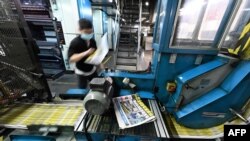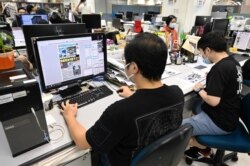Hong Kong is a city going through change, and Beijing wants no one to complain.
After the anti-government protests of two years ago, China's central government imposed a new national security law on Hong Kong, prohibiting things like secession and foreign collusion, as loosely defined by the government.
A sweeping crackdown ensued, with the arrest of dozens of activists and former lawmakers.
The security law's broad scope and vagueness have prompted concerns about censorship and press freedom. But for Apple Daily, regarded as Hong Kong's last pro-democracy newspaper, those have been concerns for some time.
Founded in 1995 by media tycoon Jimmy Lai, Apple Daily is a tabloid newspaper that initially reported about entertainment and crime and became known for its colorful images and sensational headlines.
A few years later, Apple Daily began reporting on politics. But unlike other newspapers in the city, it emerged as a sharp critic of Beijing. The paper's aggressive posture was costly; advertising revenue declined as cautious sponsors — banking giants HSBC and Standard Charter among them — pulled back.
Last August, Lai, 73, one of Hong Kong's prominent pro-democracy leaders, was arrested under the security law on an accusation of foreign collusion. Dozens of blue-shirted police raided the Apple Daily offices.
Lai was eventually charged and is now awaiting trial while in prison for other offenses related to his activism.
Hong Kong authorities recently froze Lai's local assets, adding further concern about the survival of his media conglomerate, Next Digital. And last month, Apple Daily's Taiwan branch decided to stop its print edition amid declining advertising revenue.
Mark Simon, who said he was representing Next Digital's biggest shareholder (Lai), told VOA via a message that Taiwan is facing "cuts," but "Hong Kong remains chugging along just fine."
As of last September, Lai held 71 percent of the company's shares, but Hong Kong authorities have stripped his voting rights, Reuters reported.
In May, Lai was sentenced to 14 months in prison for his role in organizing a protest in October 2019. On the day of his guilty plea, the Hong Kong stock exchange stopped trading Next Digital shares. The next day when trading resumed, the company's shares surged by 330 percent.
Next Digital released a statement last week saying that without Lai's assets, the company has enough working capital for at least 16 months.
There is a defiant mood among sympathizers to keep the publication alive.
Hong Kongers reportedly have been investing in Apple Daily stock since Lai's arrest. But journalists working for the operation are under no illusions.
A senior reporter, who asked to be identified only as Lee for fear of reprisal, told VOA the newspaper has to deal with constant rumors on social media. One recent rumor claimed that all Apple Daily journalists would be arrested on July 1.
"Some of our colleagues were quite worried about it," Lee said. "Ryan [Law Wai-kwong, the Apple Daily editor-in-chief] told us we can handle it, keep working, don't worry."
Citing the national security law and criticism from pro-Beijing state media, Lee said Apple Daily is in a "political fight." The security law, under which the authorities claim jurisdiction anywhere in the world, has made reporting on China more difficult.
"We know the red line, but we don't know where it is," Lee said. "We used to write 'Wuhan virus,' but now we are using the word 'pandemic' instead.
"We all know Apple Daily will be closed in the future, maybe one year, two years," Lee said.
A former journalist who also asked for anonymity told VOA that China's targeting of Apple Daily was one of the reasons she quit the paper.
As for morale, she said the office atmosphere was "gloomy" and that some staff were losing their incentive. Expected raises haven't happened in the past two years. Bonuses have been offered and wages have been paid on time, but that hasn't prevented "gradual resignations" in recent months, she said.
Many in the company believe Apple Daily has "no hope" in the news industry, she said. "The government froze the assets of Jimmy Lai and said our CEO [Cheung Kim Hung] cannot help with any financial activities because he's under bail. Some bankers have been warned [not] to manage their financial statements," she said.
Shadowing the economic challenges is the prospect that Hong Kong will adopt a chilling "fake news" law.
"Everyone in Apple Daily knows there is a 'due date' and everyone is planning for it," the former journalist said. "They are preparing for this every day. You never know when the police will storm into the office again."
Under pressure from Beijing, Radio Television Hong Kong — the only public broadcaster in the city — has seen TV shows axed for alleged bias and journalists fired while Hong Kong Chief Executive Carrie Lam was given a TV segment.
Keith Richburg, a journalism professor at the University of Hong Kong and president of the Foreign Correspondents Club Hong Kong, said any media that question the government ultimately will be targeted.
"Anything that seems critical of the government or the national security law or the electoral changes imposed on Hong Kong from above, anyone critical of those things, they seem to be going after," Richburg told VOA. "It's troubling."







